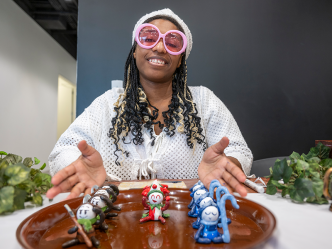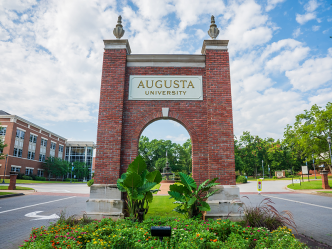The Augusta University College of Education, in collaboration with the Jessye Norman School of the Arts, will host UNBROKEN, a showcase of works by local artists and teachers from several school districts at The Ice Plant in Waynesboro, Georgia, on April 26 from 6-8 p.m. Admission is free.
Mehndi is a form of body art in which decorative designs are created on a person’s body, using a paste created from the powdered dry leaves of the henna plant. The art form is popular in the Indian subcontinent, Africa and the Middle East.
UNBROKEN showcases two-dimensional and three-dimensional art created by a variety of amateur local artists, and dancers from the Jessye Norman School of the Arts will echo the cultural roots of mehndi.
The bulk of the work was created by 13 teachers from Burke County schools, two teachers from Richmond County schools and one teacher from Jefferson county schools who are working with the Augusta University College of Education to learn to incorporate an integrative STEAM curriculum into their schools.
Dr. Ashley Gess, professor of STEAM (science, technology, engineering, art, mathematics) education at Augusta University, said that mehndi works on several levels to explore the relationships between STEAM concepts. Mehndi is geometric and emphasizes harmony of design.
“Culturally, mehndi is important to a wide range of people,” Gess said. “And when teachers are teaching kids of different cultures, it’s important to be able to connect with them. But it’s also a highly symbolic art form. Even the placement of the design on the body is meaningful.”
The purpose of the academic program the teachers are completing is to begin the process of transformation from a traditional teacher to one who can embrace students of different cultures and different individual needs.
“In order to do that, teachers need to transform themselves. The mehndi represents their personal transformations and, of course, their mastery of the course objectives,” Gess said.
The benefits of a STEAM curriculum are overwhelmingly enjoyed by schoolchildren. Research shows that using art to provide context to apply math and science knowledge has been shown to ease students’ transitions in to studying STEM subjects and pursuing employment in those and related fields.
“Art elevates the curriculum when the focus is on the design process, and effective STEAM education results in deeper understandings and improved confidence for students,” Gess said.
For more information, contact: Dr. Ashley Gess at STEAMED@augusta.edu or 706-737-1496.
 Augusta University
Augusta University




